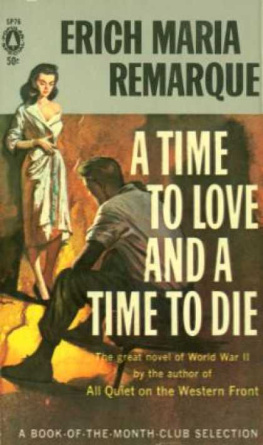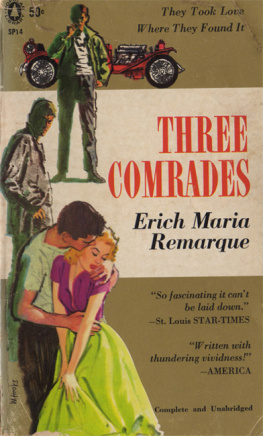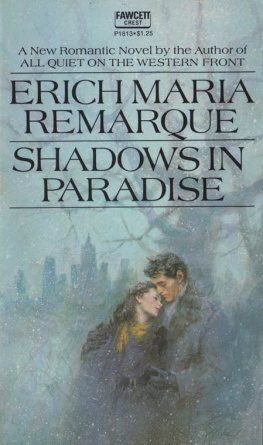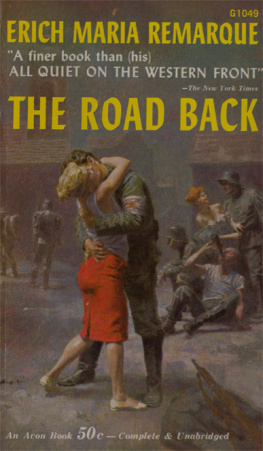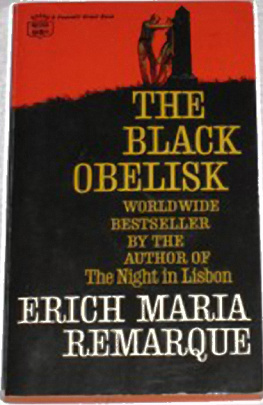
Eight Stories
Eight Stories
Tales of War and Loss
Erich Maria Remarque
Introduction by Maria Tatar and Larry Wolff

W ASHINGTON M EWS B OOKS
An Imprint of N EW Y ORK U NIVERSITY P RESS
New York
W ASHINGTON M EWS B OOKS
An Imprint of
N EW Y ORK U NIVERSITY P RESS
New York
www.nyupress.org | 2018 by New York University | All rights reserved
References to Internet websites (URLs) were accurate at the time of writing. Neither the author nor New York University Press is responsible for URLs that may have expired or changed since the manuscript was prepared.
Library of Congress Cataloging-in-Publication Data
Names: Remarque, Erich Maria, 18981970 author. | Tatar, Maria, 1945 author of introduction. | Wolff, Larry author of introduction.
Title: Eight stories : tales of war and loss / Erich Maria Remarque ; introduction by Maria Tatar and Larry Wolff.
Description: New York : Washington Mews Books, 2018. | Seven of the eight short stories in this collection were originally published in Colliers magazine. The eighth story, Dreamt Last Night, was published in Redbook magazine. | Includes bibliographical references and index. Identifiers: LCCN 2017054994| ISBN 9781479824854 (cl : alk. paper) | ISBN 9781479888092 (pb : alk. paper)
Classification: LCC PT2635.E68 A2 2018 | DDC 833/.912dc23
LC record available at https://lccn.loc.gov/2017054994
New York University Press books are printed on acid-free paper, and their binding materials are chosen for strength and durability. We strive to use environmentally responsible suppliers and materials to the greatest extent possible in publishing our books.
Manufactured in the United States of America
10 9 8 7 6 5 4 3 2 1
Also available as an ebook
Contents
Maria Tatar and Larry Wolff
Seven of the eight short stories in this collection were originally published in Colliers magazine. The eighth story, I Dreamt Last Night, was published in Redbook Magazine. Translators were not credited alongside Remarques byline with the stories, and the copyright record for the individual stories stated that the translator was anonymous and for hire. Likely translators for the stories are either A. W. Wheen, who translated many of Remarques works from German to English, including All Quiet on the Western Front, or Denver Lindley, who also translated a number of Remarques novels and who worked as an editor at Colliers beginning in 1927.
Original Publication Dates of Selected Stories
The Enemy, Colliers National Weekly, March 29, 1930
Silence, Colliers National Weekly, June 28, 1930
Where Karl Had Fought, Colliers National Weekly, August 23, 1930
Josefs Wife, Colliers National Weekly, November 21, 1931
Annettes Love Story, Colliers National Weekly, November 28, 1931
The Strange Fate of Johann Bartok, Colliers National Weekly, December 5, 1931
On the Road, Colliers National Weekly, January 20, 1934
I Dreamt Last Night, Redbook Magazine, December 1, 1934
Writing about War for the American Public in the 1930s
Maria Tatar, Harvard University
Larry Wolff, New York University
In 1945 Erich Maria Remarque told a New York Times reporter that he was no longer a German: For I do not think in German nor feel German, nor talk German. Even when I dream it is about America, and when I swear, it is in American. He had left Germany for Switzerland in 1933, just a day before Adolf Hitler was named chancellor. Stripped of German citizenship in 1938, Remarque had already made a new home for himself in the Swiss village of Porto Ronco near Locarno. A year later, together with his ex-wife Ilse Sambona (the two had divorced in 1930), he sailed to the United States on the Queen Mary. War broke out while they were at sea, and the ship was led to port by a British cruiser. Remarque became a naturalized citizen of the United States in 1947.
Remarques name is so closely associated with the novel All Quiet on the Western Front (the books title referred ironically to a recurring phrase in the Kaisers wartime communiqus) that it is easy to forget how his literary career extended into and beyond the 1930s and that he became something of a celebrity writer in the United States. Less reclusive than one might expect from an author who captured the existential distress of an entire generation, he consorted with an international Hollywood set that included Marlene Dietrich, Charlie Chaplin, Greta Garbo, Luise Rainer, Douglas Sirk, and Paulette Goddard (who later became his second wife). Still, the New York Times reported in Remarques obituary that the reputation as a nightclubber and frequent appearances at the Stork Club and at 21 did not really mark him as a carouser so much as a night owl with a taste for fine foods and memorable champagne.
Los Angeles, with its colony of German exiles, seemed like a natural second home for Remarque, who turned his melancholy good looks and European sophistication to good account. Refugees from Hitler arrived in droves, the actor David Niven recalled. When Erich Maria Remarque was not wrapped around Marlene Dietrich or other local beauties, he acted as a sort of liaison officer.
It did not help that the community of German refugee writers in Los Angeles had failed to embrace Remarque as one of their own. Was it professional jealousy? Intellectual snobbery? Remarque had, after all, attained a degree of international celebrity and commercial success through the publication of All Quiet on the Western Front that seemed to outdo Thomas Mann and Bertolt Brecht, luminaries in the German-speaking worldeven if Mann was the writer who had secured the Nobel Prize. Remarque has made it clear he hates me, Thomas Mann confided in his diary. His boorish behavior had made that clear before.
Erich Paul Remark was born in the German city Osnabrck in 1898. He later reverted to the original French spelling of his last name (with the hope of dissociating himself from the extravagances of the first novel he had written, the title of which he said he would refuse to divulge, even under torture) and added the middle name Maria, most likely as a double homage to his mother and to the poet Rainer Maria Rilke. Conscripted into the German army at age eighteen in 1917, he was moved toward the Western front and served in a trench unit in Belgium based somewhere between the town of Thourout and the forest of Houthulst. Wounded during the Battle of Flanders that same year, he spent the last two years of the war in a German army hospital. In the postwar period he took a range of jobs, in advertising (writing copy) and in sales (specializing in monuments and tombstones). He also worked, with limited success, as a journalist, teacher, and editor.
Remarques second novel, All Quiet on the Western Front, was written in 1927 and did not immediately find a publisher. But once the Vossische Zeitung serialized the work to great acclaim in 1928, it was picked up by the distinguished publishing house Ullstein and became an instant bestseller, despite brisk competition from a wave of war novels appearing in the late 1920s. Remarques novel captured the imagination not just of war veterans, but also of an entire civilian population. Its appeal crossed national boundaries and the volume was quickly translated into dozens of languages, with remarkably strong sales continuing over the decades. In America the book became a standard feature of high school curricula and summer reading assignments.
Next page

